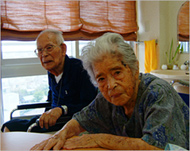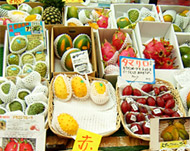Changing Japanese diet takes its toll
Just three years after revealing why the people of the southern Japanese prefecture of Okinawa live longer than anyone else in the world, the same gerontologists say the islanders’ golden era of longevity is coming to a halt.

Written by three experts who drew on the experiences of hundreds of centenarians, The Okinawa Program was published in 2001.
It shot to the top of the best-sellers list around the world thanks to the long list of lifestyle improvement tips that can have an impact in as little as four weeks. Sales were also given a boost after the book was featured on Oprah Winfrey’s daytime chat show in the United States.
But its authors say the life expectancies of the people of the Longevity Islands, as they have been dubbed, are today dropping rapidly.
“The younger people here in Okinawa are eating pretty much the same sort of things that youngsters are eating in mainland Japan today,” Craig Willcox, a Canadian anthropologist and expert in cross-cultural gerontology, said.
Fast-food heaven
“This is fast-food heaven and, as a result, life expectancy is dropping rapidly,” Wilcox, an assistant professor at Okinawa Prefectural University of Nursing, said.
 |
|
Japan is home to 200 people over |
Since the 2000 national census, he said, Okinawan men have tumbled from fourth out of Japan’s 47 prefectures in terms of longevity to 26th. For men aged over 65, however, Okinawans are still the longest lived.
As of 1 September, 635 Okinawans were 100 years old or older, according to the longevity division of the prefectural government, with another 262 to reach that milestone within the next 12 months.
Okinawa is also home to 12 super-centenarians, people over the age of 110. In the whole of Japan, there are a mere 200 who have reached that age.
High in green
But it is the younger generations who are rewriting the statistics of a scientific study that was begun nearly 30 years ago by Makoto Suzuki, now a professor at Okinawa International University and joint author of The Okinawa Program, along with Craig Willcox’s brother, Bradley.
 |
|
Older Okinawans were fishermen |
“It is a combination of factors, of course, but fast food is causing rising obestity levels, with young people here the fattest in Japan,” said Suzuki. “But when you look at people in their 60s, they’re very lean.”
The traditional Okinawan diet, he says, is high in green and yellow vegetables, as well as tofu in various forms, but low in calorific density.
Fish is also frequently on the menu here, and although local people might say their favourite is pork and that they eat it often, in fact they eat very little more than the average Japanese, according to the study.
‘Finger work’
“Mostly it has been fresh vegetables as the staple and they are good for you, but now that is changing,” Suzuki said. A walk through central Naha will confirm that, as fast-food restaurants proliferate.
|
“We now have a car society here and I would say that people in Tokyo take more steps every day going to work and coming home again than the average Okinawan” Craig Willcox, |
“Most of the older people now were farmers or fishermen who worked hard when they were younger, which is good for the body, but young people today do ‘finger work’ and use few muscles,” he said. “That increases fat in the muscle and falls well short of exercise for the whole body.”
Combined with the gradual erosion of the traditional way of life in the islands, including a sense of community in which neighbours would look out for one another’s welfare and fewer people taking part in cultural activities, such as music, dance and plays, the entire Okinawan way of life may be under threat.
Common sense
“It is hard to change powerful social forces,” says Willcox. “We now have a car society here and I would say that people in Tokyo take more steps every day going to work and coming home again than the average Okinawan.
 |
|
Traditional Okinawan diet is rich |
“Add to that the fact that many couples now work and buy fast food that has lots of meat and is high in kilocalories,” he said.
But for older Okinawans, a long and healthy life is all down to common sense. Shizu Irei left the outlying island of Izena before World War II to work as a maid in Yokohama. Today, she works from 11am until 11pm at the Guru Kun restaurant in central Naha.
“Why do Okinawans live longer than other people? It’s the same anywhere you go; if you eat and sleep well, then that’s all you need,” says the sprightly 85-year-old.
Way of thinking
“I always eat fresh food and before I go to sleep and in the morning I do some exercises, moving my arms and legs,” she says. Irei – whose mother lived to the ripe old age of 103 – walks two kilometres to work every morning, but takes a taxi home after cleaning the restaurant at the end of the night.
|
“Most of the older Makoto Suzuki, |
“I take time off when I need it, so I often work 10 days straight,” she said. “I want to keep working for health reasons and I don’t mind being on my feet. In fact, I prefer standing to sitting because it’s easier for my body when I am moving.
“Vegetables are my favourite food, along with pigs’ trotters, which are very good for you because they are full of collagen,” she said, adding that she does not drink any alcohol.
Irei also displays the attributes that Suzuki believes are just as important to a long life as a healthy diet and regular exercise.
“A big element of longevity is the way of thinking,” he believes.
Diet Plan
“Older Okinawan people were never in a hurry, they had a special relationship with friends and the community in which they never refused to help someone if they were asked and neighbours always helped each other,” Suzuki said.
 |
|
Shizu Irei, 85, walks 2km to work |
“If you look at Tokyo or Osaka, someone could die in the neighbouring apartment and nobody would even know about it.”
Dr Suzuki has again collaborated with the Willcox brothers on a new book that was published in June. The Okinawa Diet Plan includes more than 150 recipes from around the islands that have contributed to their residents’ long lives, ranging from Buddhist temple tofu to gumbo a la Okinawa and tapioca sweet potato dessert.
And while the book is aimed at a Western market, the younger generations of Okinawans should perhaps be trying out some of the recipes.
“I’m afraid that in as little as a decade, Okinawans’ fame for their longevity will be a thing of the past,” said Dr Willcox.